Rahul Gandhi: The Reluctant Politician
A look at the life and career of India's shyest politician
-
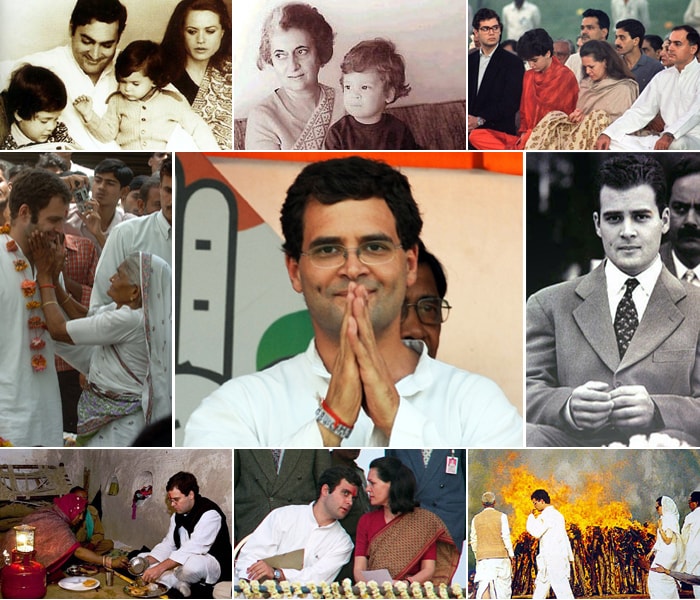 In the months leading up to the elections, Rahul Gandhi strenuously refused to be named as the Congress' man for the top job. Congressmen of all hues, however, said that there was nobody else that the party, led for generations by the Nehru-Gandhi dynasty, would rather see as Prime Minister - if they won. It is now certain that victory has eluded them.
In the months leading up to the elections, Rahul Gandhi strenuously refused to be named as the Congress' man for the top job. Congressmen of all hues, however, said that there was nobody else that the party, led for generations by the Nehru-Gandhi dynasty, would rather see as Prime Minister - if they won. It is now certain that victory has eluded them.
Ahead: a look at the life and career of one of India's shyest politicians. -
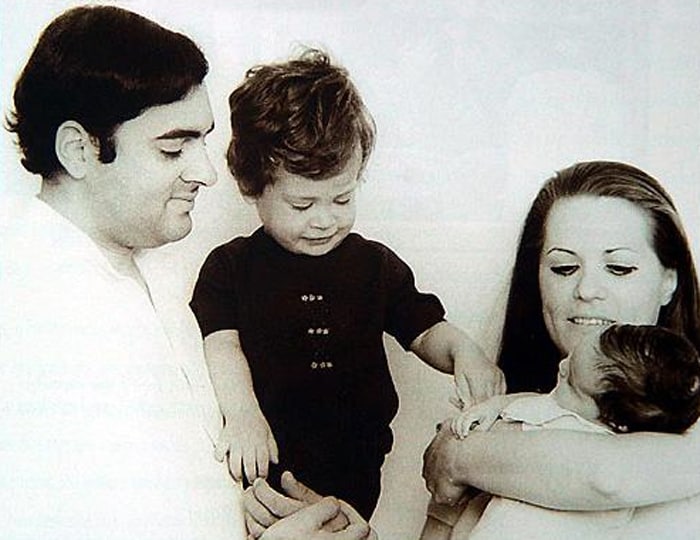 A scion of the Nehru-Gandhi family, Rahul was born on June 19, 1970 to Rajiv and Sonia Gandhi. Now 43, he is the older of the two children. His sister Priyanka is two years younger.
A scion of the Nehru-Gandhi family, Rahul was born on June 19, 1970 to Rajiv and Sonia Gandhi. Now 43, he is the older of the two children. His sister Priyanka is two years younger. -
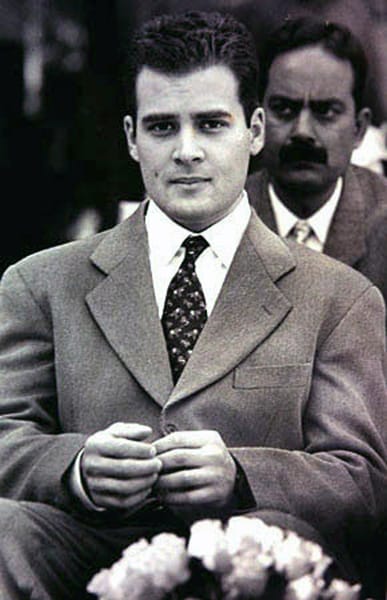 Rahul attended Modern School in New Delhi for some years before switching to Doon School, also his father's alma mater. Rahul shifted colleges from St Stephens to Harvard and finally Rollins College in Florida where he graduated from in 1994. He and went on to do an M Phil in Development Studies in 1995 from Trinity College, Cambridge.
Rahul attended Modern School in New Delhi for some years before switching to Doon School, also his father's alma mater. Rahul shifted colleges from St Stephens to Harvard and finally Rollins College in Florida where he graduated from in 1994. He and went on to do an M Phil in Development Studies in 1995 from Trinity College, Cambridge. -
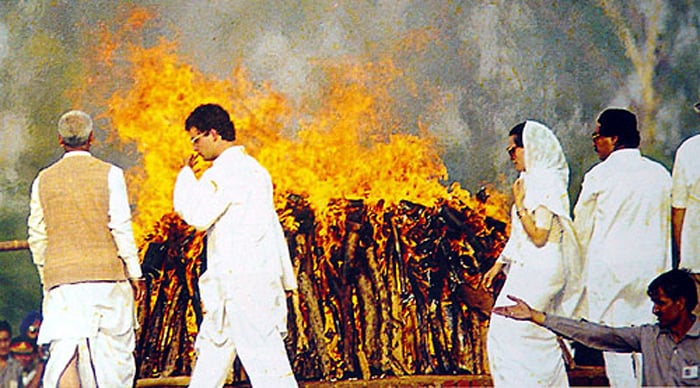 On May 21, 1991, the lives of the young Gandhis changed forever. On the campaign trail, Rajiv Gandhi was assassinated by LTTE activists in Sriperumbudur, Tamil Nadu. In this picture, Rahul, just 21 at that time, is seen lighting his father's funeral pyre.
On May 21, 1991, the lives of the young Gandhis changed forever. On the campaign trail, Rajiv Gandhi was assassinated by LTTE activists in Sriperumbudur, Tamil Nadu. In this picture, Rahul, just 21 at that time, is seen lighting his father's funeral pyre. -
![Years later, when Rahul's sister Priyanka decided to visit Nalini Sriharan, the only surviving member of the Rajiv Gandhi assassination squad, at the Vellore jail in Tamil Nadu, Rahul told mediapersons that the trauma of his father's brutal killing was now a thing of the past. "We have been brought up not to harbour [thoughts of] hatred or violence," he was quoted as saying.<br><br>In this picture taken on May 24, 1991, Sonia Gandhi, Priyanka and Rahul, turn to chanting mourners during the funeral of Rajiv Gandhi at Shakti Sthal on the banks of the River Yamuna in New Delhi. (Photo: AFP) Years later, when Rahul's sister Priyanka decided to visit Nalini Sriharan, the only surviving member of the Rajiv Gandhi assassination squad, at the Vellore jail in Tamil Nadu, Rahul told mediapersons that the trauma of his father's brutal killing was now a thing of the past. "We have been brought up not to harbour [thoughts of] hatred or violence," he was quoted as saying.<br><br>In this picture taken on May 24, 1991, Sonia Gandhi, Priyanka and Rahul, turn to chanting mourners during the funeral of Rajiv Gandhi at Shakti Sthal on the banks of the River Yamuna in New Delhi. (Photo: AFP)](https://drop.ndtv.com/albums/NEWS/rahulorissa/be21b.jpg) Years later, when Rahul's sister Priyanka decided to visit Nalini Sriharan, the only surviving member of the Rajiv Gandhi assassination squad, at the Vellore jail in Tamil Nadu, Rahul told mediapersons that the trauma of his father's brutal killing was now a thing of the past. "We have been brought up not to harbour [thoughts of] hatred or violence," he was quoted as saying.
Years later, when Rahul's sister Priyanka decided to visit Nalini Sriharan, the only surviving member of the Rajiv Gandhi assassination squad, at the Vellore jail in Tamil Nadu, Rahul told mediapersons that the trauma of his father's brutal killing was now a thing of the past. "We have been brought up not to harbour [thoughts of] hatred or violence," he was quoted as saying.
In this picture taken on May 24, 1991, Sonia Gandhi, Priyanka and Rahul, turn to chanting mourners during the funeral of Rajiv Gandhi at Shakti Sthal on the banks of the River Yamuna in New Delhi. (Photo: AFP) -
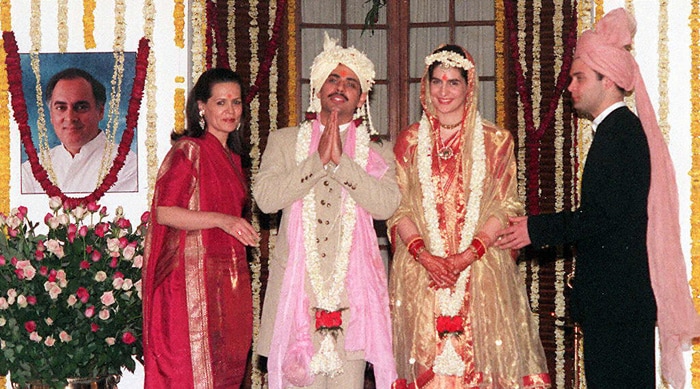 After the death of his father, Rahul stayed out of public life for years. He was spotted at a few family occasions like the wedding of his sister Priyanka to businessman Robert Vadra on February 18, 1997. (Photo: AFP)
After the death of his father, Rahul stayed out of public life for years. He was spotted at a few family occasions like the wedding of his sister Priyanka to businessman Robert Vadra on February 18, 1997. (Photo: AFP) -
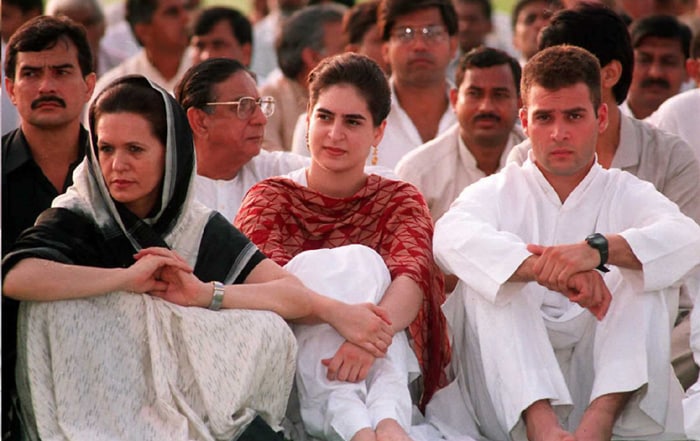 Then came Rahul's first brush with the country's electoral process. He left his job at a financial consultancy firm in UK and returned to India to help his mother, by then the elected Congress President, prepare for the 1999 Lok Sabha elections.
Then came Rahul's first brush with the country's electoral process. He left his job at a financial consultancy firm in UK and returned to India to help his mother, by then the elected Congress President, prepare for the 1999 Lok Sabha elections. -
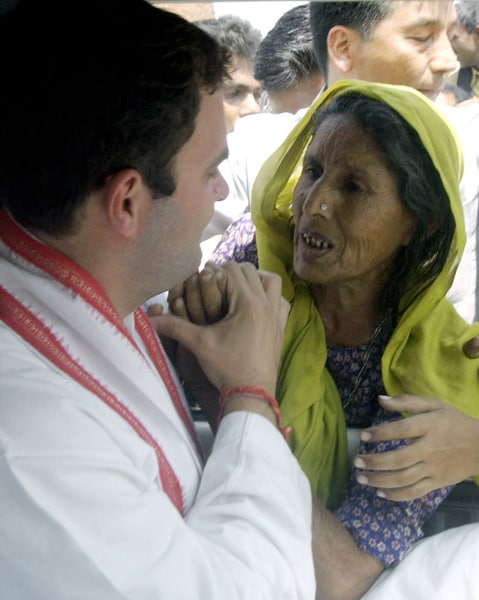 Over the next few years, Rahul remained on the sidelines of political life but grew increasingly visible, prompting speculation that he would soon take on an official role in the Congress. In January 2004, he visited his father's former constituency of Amethi and said, in typically oblique fashion, "I am not averse to politics. I have not decided when I will enter politics and indeed, if I ever will."
Over the next few years, Rahul remained on the sidelines of political life but grew increasingly visible, prompting speculation that he would soon take on an official role in the Congress. In January 2004, he visited his father's former constituency of Amethi and said, in typically oblique fashion, "I am not averse to politics. I have not decided when I will enter politics and indeed, if I ever will."
Just two months later, in March 2004, he announced his intention to contest the May elections, standing from Amethi. In this file photo dated March 29, 2004, Rahul Gandhi speaks to an elderly woman in Jamon village near Amethi. (Photo: AFP) -
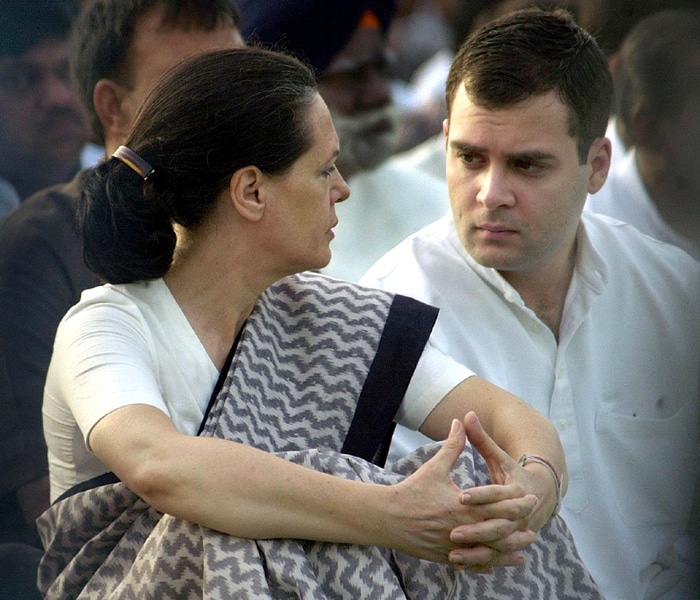 The official arrival of the next generation of the Nehru-Gandhis was widely expected to rejuvenate the Congress party's political fortunes among young India. In his first interview to the foreign media, he portrayed himself as a uniter of the country and condemned "divisive" politics in India, saying that he would try to reduce caste and religious tensions. (AFP Photo)
The official arrival of the next generation of the Nehru-Gandhis was widely expected to rejuvenate the Congress party's political fortunes among young India. In his first interview to the foreign media, he portrayed himself as a uniter of the country and condemned "divisive" politics in India, saying that he would try to reduce caste and religious tensions. (AFP Photo) -
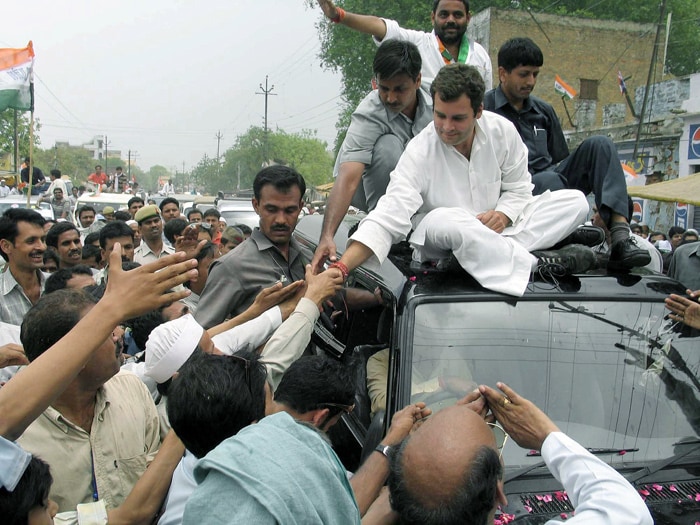 Amethi was beside itself with excitement and elected Rahul with a landslide majority. His campaign was masterminded by his younger sister, Priyanka. In this file photo from April 23, 2004, Rahul is seen shaking hands with supporters from the roof of a car in Varanasi, Uttar Pradesh. (Photo: AFP)
Amethi was beside itself with excitement and elected Rahul with a landslide majority. His campaign was masterminded by his younger sister, Priyanka. In this file photo from April 23, 2004, Rahul is seen shaking hands with supporters from the roof of a car in Varanasi, Uttar Pradesh. (Photo: AFP) -
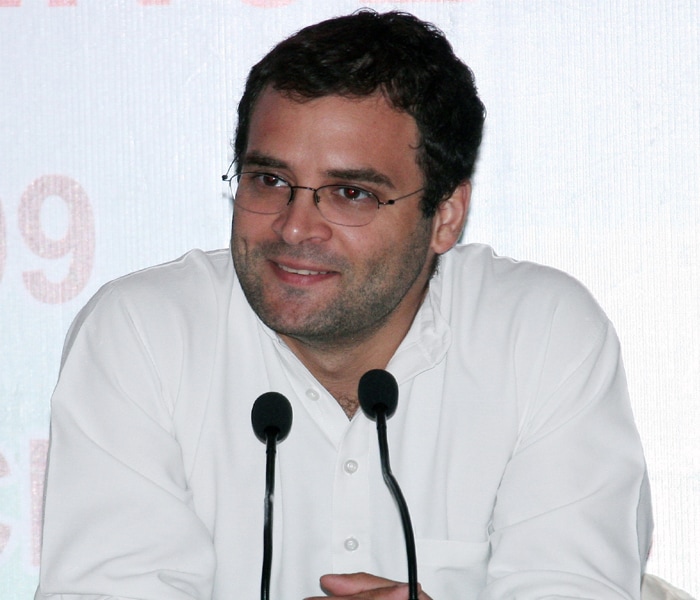 Rahul was appointed General Secretary of the Congress on September 24, 2007 in a reshuffle of the party secretariat. In the same reshuffle, he was also given charge of the Youth Congress and the National Students Union of India. (Photo: AFP)
Rahul was appointed General Secretary of the Congress on September 24, 2007 in a reshuffle of the party secretariat. In the same reshuffle, he was also given charge of the Youth Congress and the National Students Union of India. (Photo: AFP) -
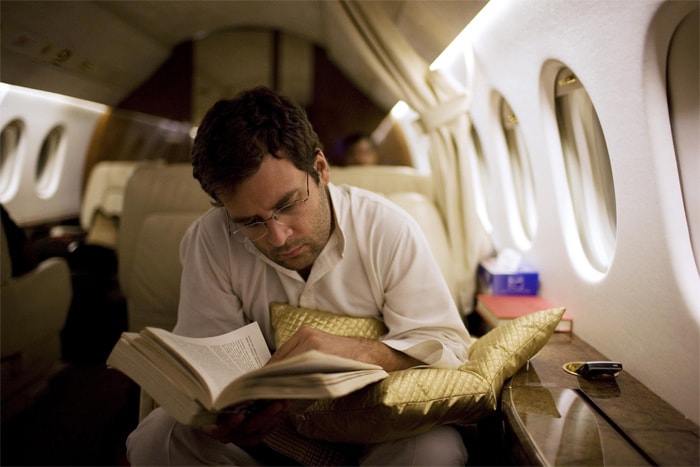 Rahul is also seen as the chief architect of the Congress Party's resounding victory in the 2009 Lok Sabha elections. He retained his Amethi constituency by defeating his nearest rival by a margin of over 333,000 votes.
Rahul is also seen as the chief architect of the Congress Party's resounding victory in the 2009 Lok Sabha elections. He retained his Amethi constituency by defeating his nearest rival by a margin of over 333,000 votes.
In these elections, the Congress is said to have revived itself in Uttar Pradesh by winning 21 out of the total 80 Lok Sabha seats and the majority of the credit for this turnaround is given to Rahul Gandhi. He spoke at 125 rallies across the country in six weeks.
His refusal of a post in the Manmohan Singh Cabinet in order to concentrate on grassroots level party work was met with admiration. (Photo: AFP) -
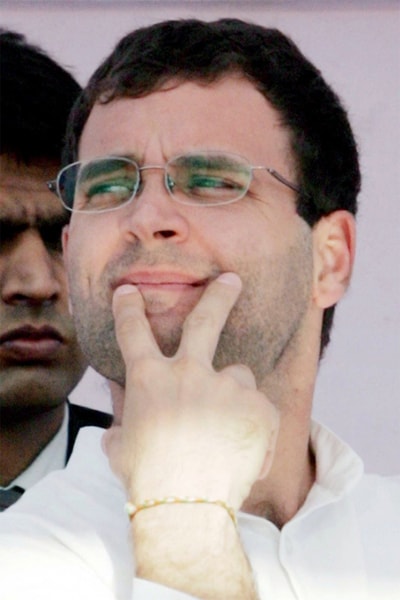 This was clearly Rahul Gandhi's summer of content as Year 2009 saw the transformation of the Gandhi heir apparent into a shrewd strategist and politician. He emerged from the shadows to campaign tirelessly in the blistering summer heat, addressing as many as 10-15 rallies a day and making inroads into the bastion of Mayawati and Mulayam Singh Yadav.
This was clearly Rahul Gandhi's summer of content as Year 2009 saw the transformation of the Gandhi heir apparent into a shrewd strategist and politician. He emerged from the shadows to campaign tirelessly in the blistering summer heat, addressing as many as 10-15 rallies a day and making inroads into the bastion of Mayawati and Mulayam Singh Yadav. -
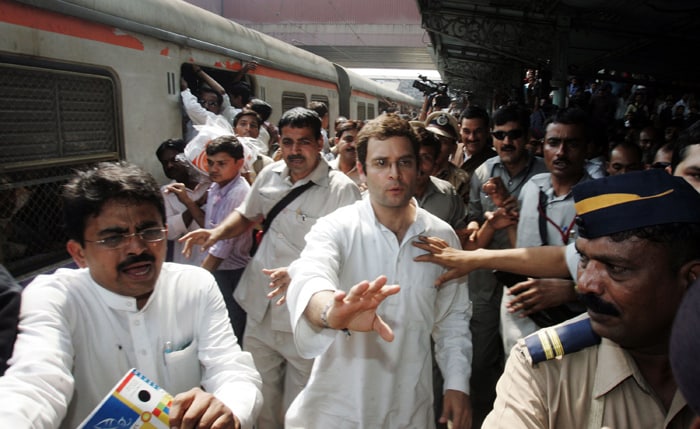 All through, Rahul has projected himself as having the common touch. In Amethi, he stays overnight in Dalit homes.
All through, Rahul has projected himself as having the common touch. In Amethi, he stays overnight in Dalit homes.
In August 2009, he took the Metro to his 10 Janpath home after landing in a rain-soaked Delhi after a two-day visit to Chhattisgarh.
In Mumbai, he stopped by an ATM and then hopped onto a local train at Dadar.(Photo: PTI) -
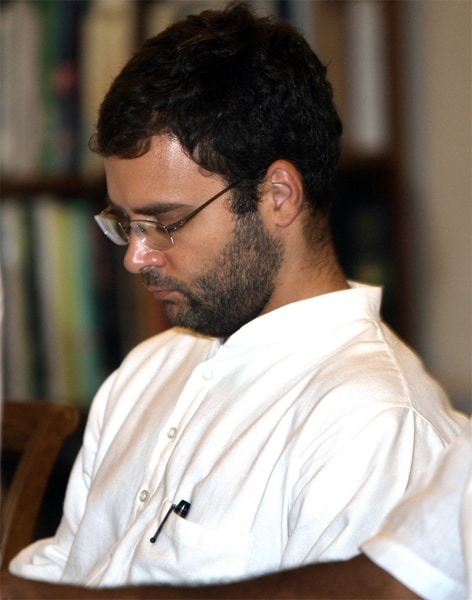 For a while, the Rahul charisma seemed to be leading the Congress to glory. Then, in 2013, came a crippling blow - a 4-0 rout in the assembly elections. Rahul said then, "The people have sent us a clear message. We have heard it, not just in our minds but in our hearts." (Photo: AFP)
For a while, the Rahul charisma seemed to be leading the Congress to glory. Then, in 2013, came a crippling blow - a 4-0 rout in the assembly elections. Rahul said then, "The people have sent us a clear message. We have heard it, not just in our minds but in our hearts." (Photo: AFP) -
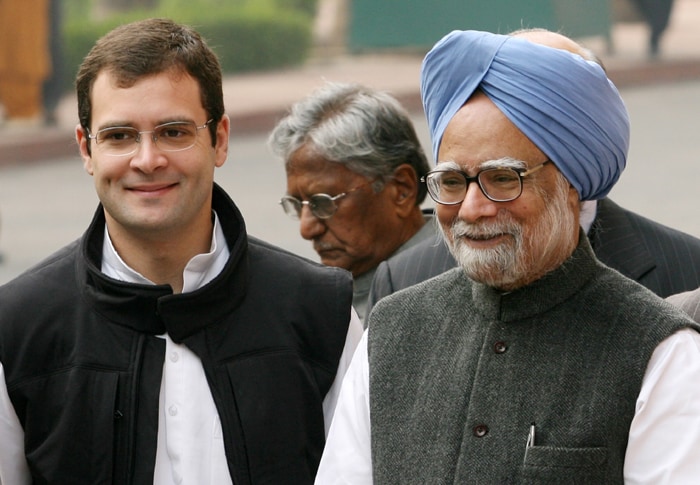 His critics have questioned his appetite for power and say his abilities and instincts remain unproven.
His critics have questioned his appetite for power and say his abilities and instincts remain unproven.
He has also been called out for publicly undermining the Prime Minister's authority in September last year by denouncing the government's decision to move a decree that would protect lawmakers convicted of corruption.
Just days ago, Rahul Gandhi was conspicuous by his absence from the Prime Minister's farewell dinner, causing another round of criticism. (AFP Photo)
Advertisement
Advertisement
Advertisement
Advertisement
